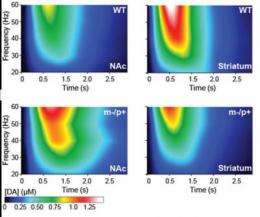Study justifies L-DOPA therapy for Angelman syndrome

Last year a clinical trial of L-DOPA—a mainstay of Parkinson's disease therapy—was launched for Angelman syndrome, a rare intellectual disorder that shares similar motor symptoms such as tremors and difficulty with balance. The clinical trial is based on a 10-year-old case report showing benefit with the drug, but few studies since have explored the neurological justification for using L-DOPA to treat parkinsonian features in Angelman syndrome.
New research from the University of North Carolina School of Medicine, conducted in animal models of the disorder, now provides justification for this therapeutic approach. The study, published online ahead of print on Nov. 12 by the Journal of Clinical Investigation, suggests that L-DOPA could compensate for a loss of the neurochemical dopamine in the brain's motor pathways and improve motor symptoms. However, it also indicates that the drug could add to an already increased amount of dopamine in the brain's reward pathways and thus have unanticipated consequences on emotion and attention.
"The results were extremely surprising, because we don't know of any other disorder where dopamine is affected one way in one brain pathway and the opposite way in another," said Benjamin D. Philpot, PhD, associate professor of cell biology and physiology at UNC.
"If what we see in humans mirrors what we see in mice, then it does provide some optimism that L-DOPA might provide benefit for tremor," said C.J. Malanga, MD, PhD, associate professor of neurology at UNC. "But it also raises caution that researchers might want to consider assessing other aspects of Angelman syndrome that might be affected by dopamine—not just motor symptoms but also other neuropsychiatric features." Malanga and Philpot are senior authors of the study.
Angelman syndrome affects about every one out of every 15,000 people. Individuals with the disorder have minimal verbal communication – some never speak a single word – as well as seizures and motor problems. It is caused by defects in UBE3A, a gene involved in the development of the brain's wiring. Much of what has been learned about this gene has come from a mouse model lacking UBE3A.
Philpot and Malanga decided to use these Angelman syndrome model mice to explore how dopamine is affected in Angelman syndrome. Dopamine is a well-known neurotransmitter, one of many chemicals responsible for transmitting signals between neurons in the brain. In their experiments, the researchers found that the behavioral deficits seen in the Angelman syndrome model were not due to the loss of dopamine-producing brain cells—as in Parkinson's disease—or reduced production of the important neurochemical.
Rather, they found that it was associated with differences in release of the dopamine molecule from brain cells. Specifically, dopamine release was decreased in one brain pathway—the motor or nigrostriatal pathway—and increased in another—the reward or mesolimbic pathway. But instead of having a greater effect on reward, dopamine also appeared to be less effective at motivating behavior in these mice.
"One of the interesting features of people with Angelman syndrome is that they generally have a very happy disposition and a lower threshold for humor. It is interesting that we found this effect in the reward pathway, because it could provide a biological basis for this happy disposition," said Philpot.
Malanga cautions that this happy disposition, as well as the lack of communication skills, might make it hard for researchers to tell if their Angelman syndrome patients are experiencing negative consequences of an altered reward pathway, such as changes in mood or compulsive behaviors. Therefore, he recommends that clinical trials assess many different outcome measures to ensure that L-DOPA treatment does not lead to unanticipated outcomes.

















